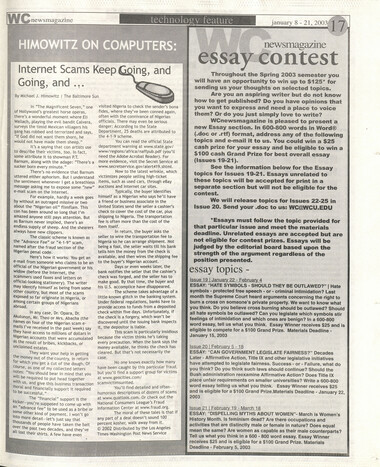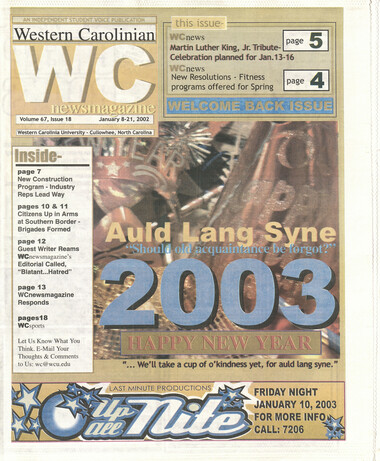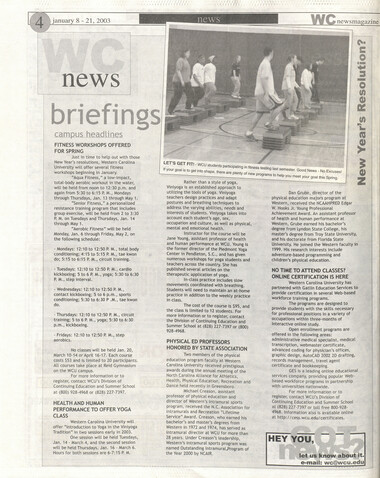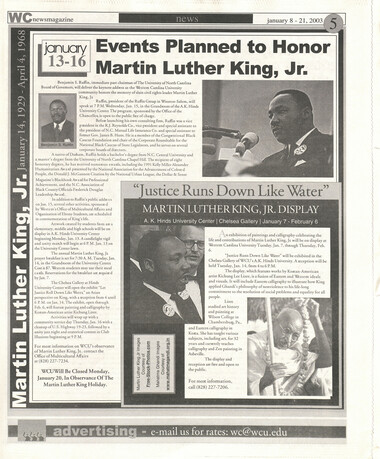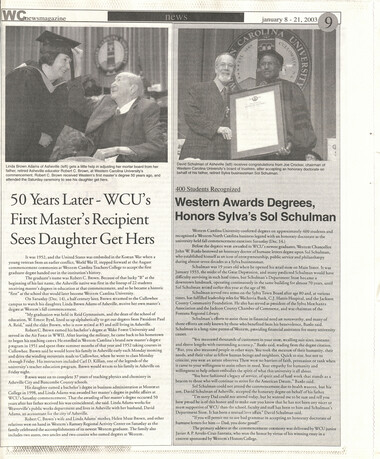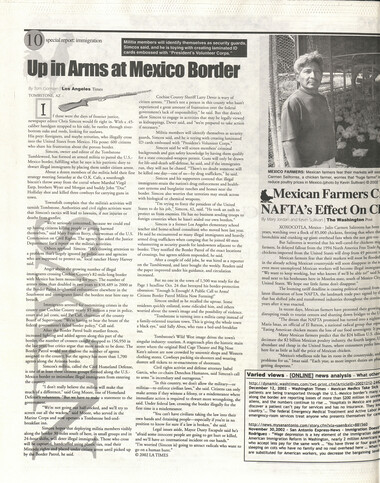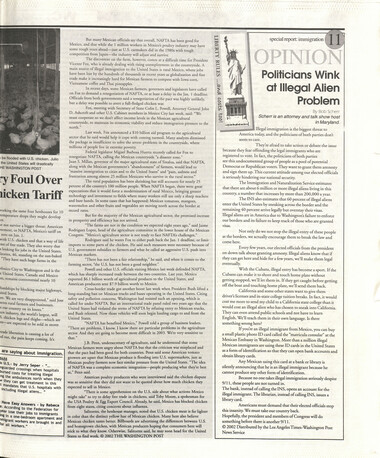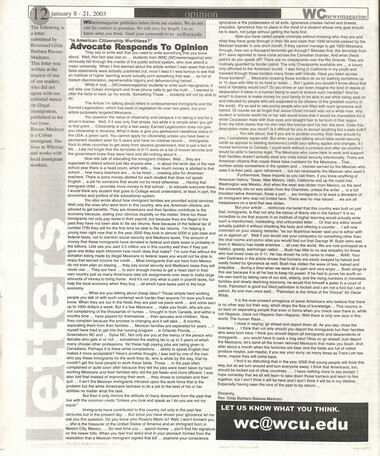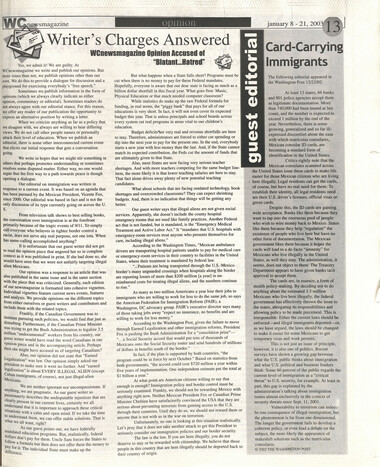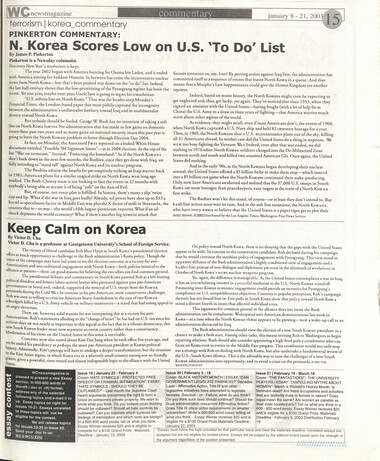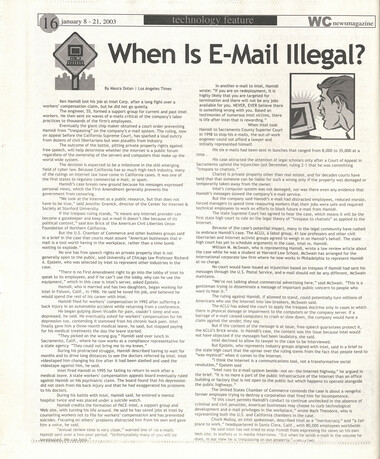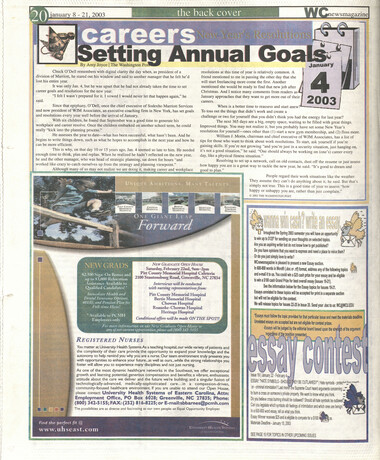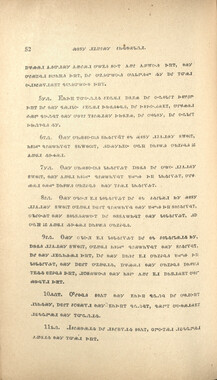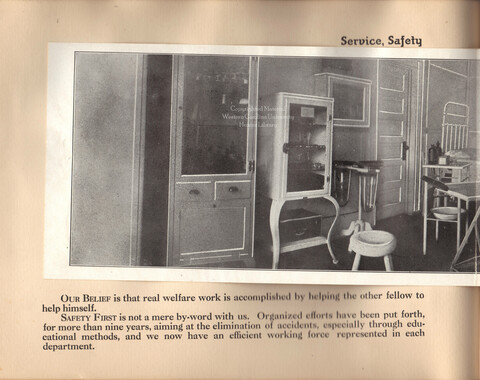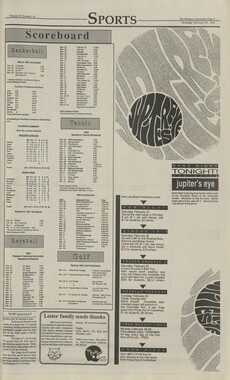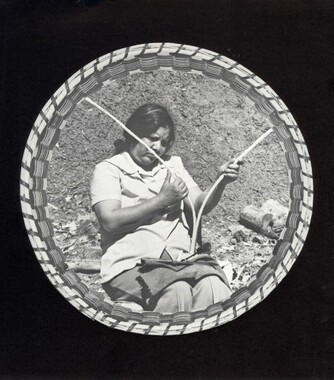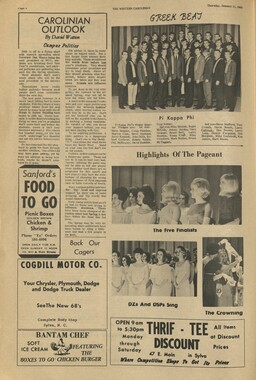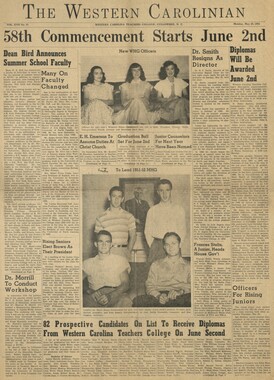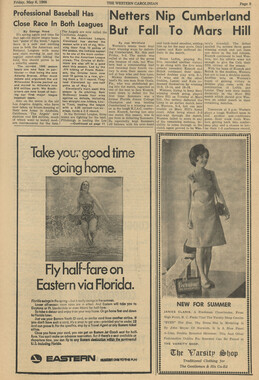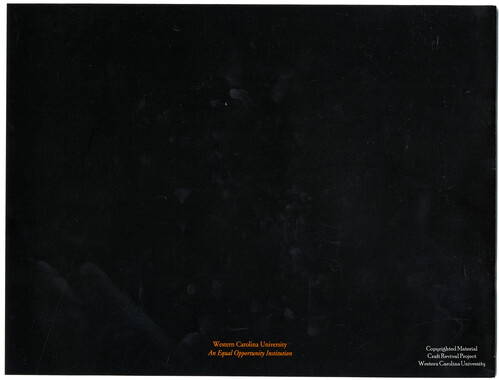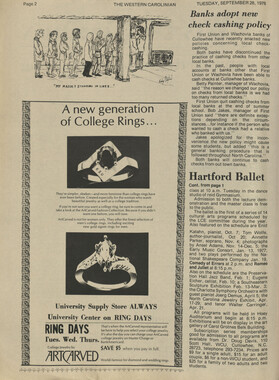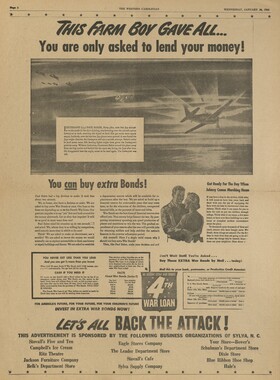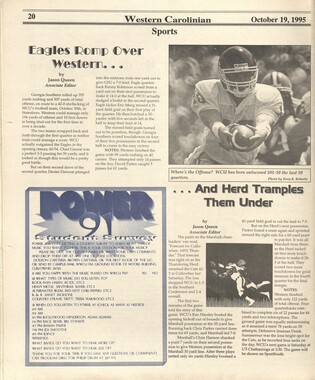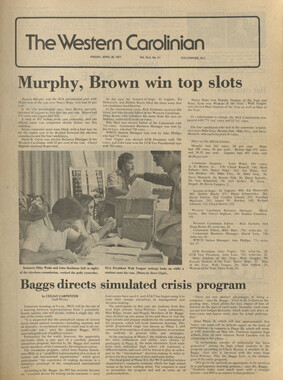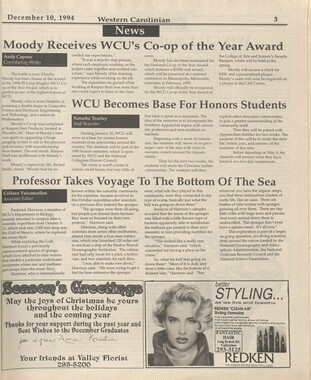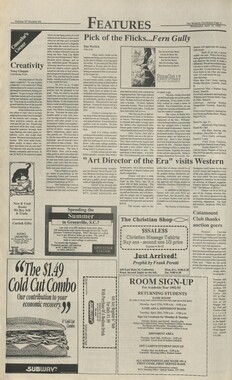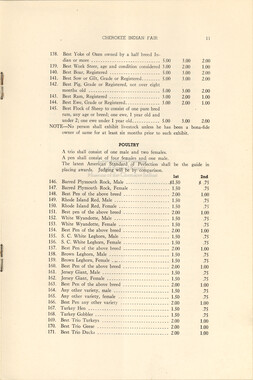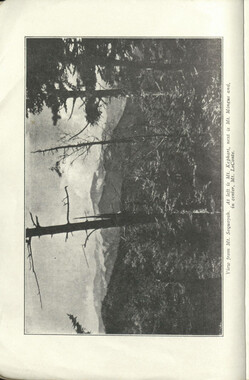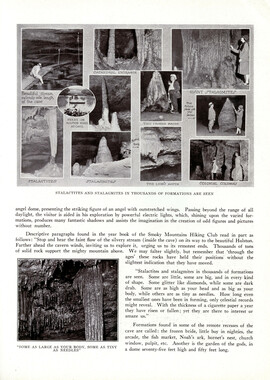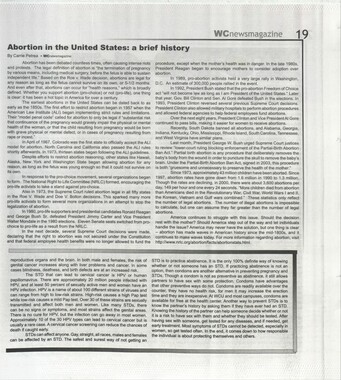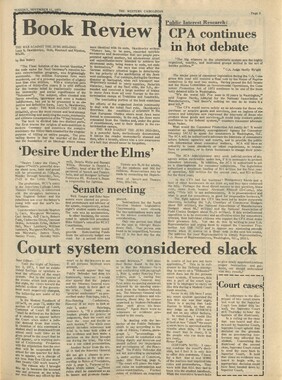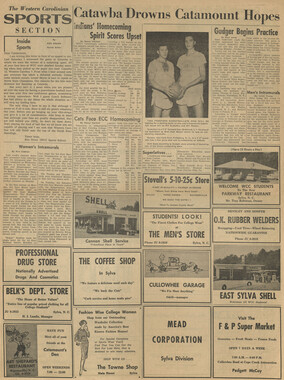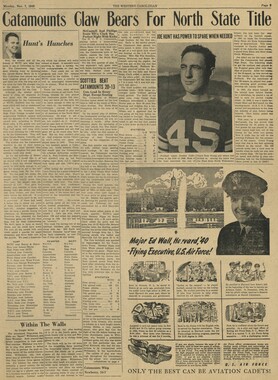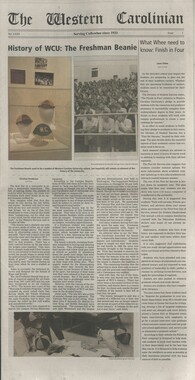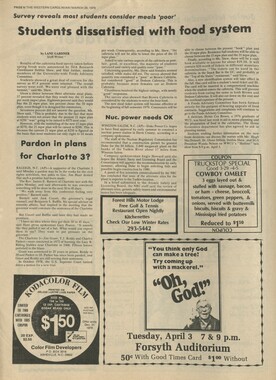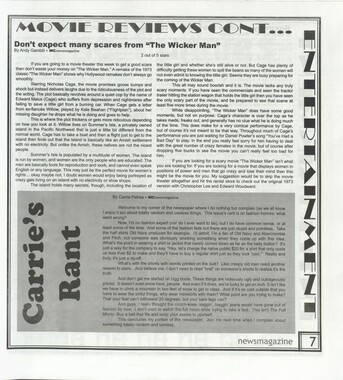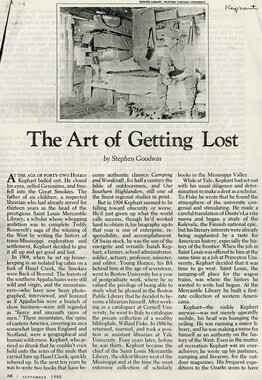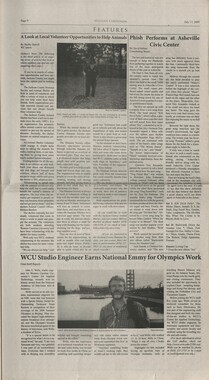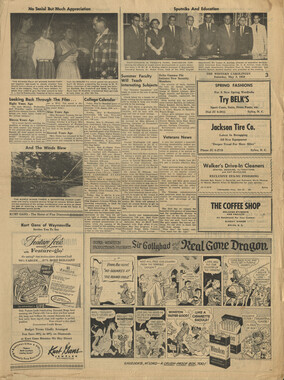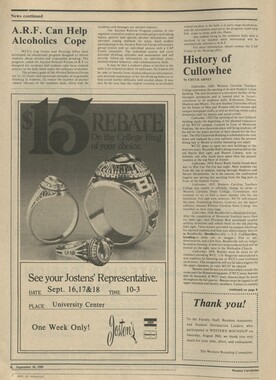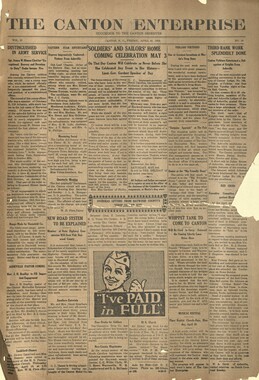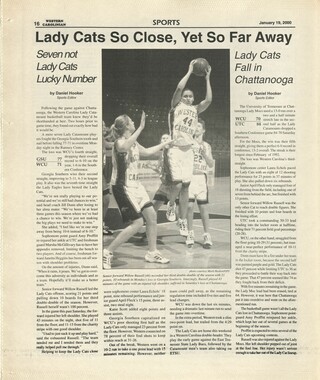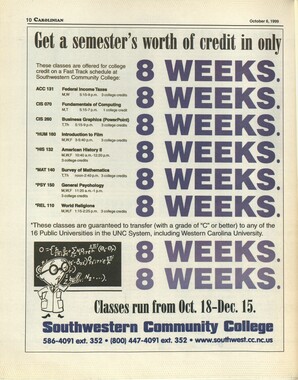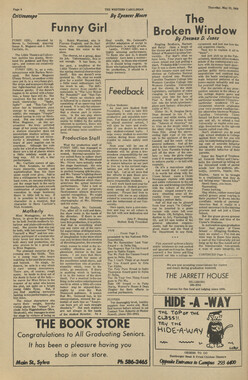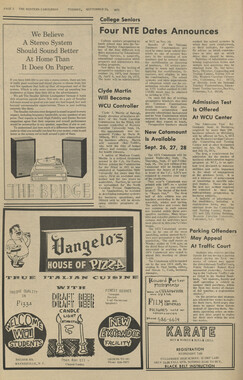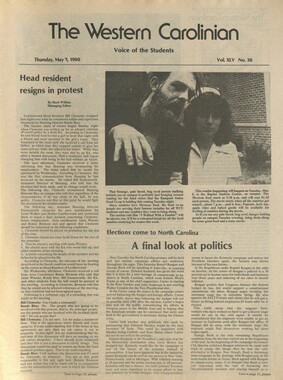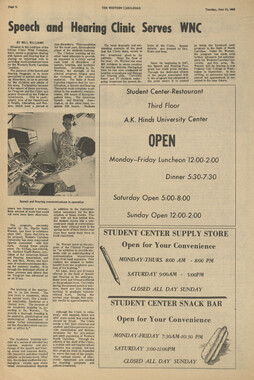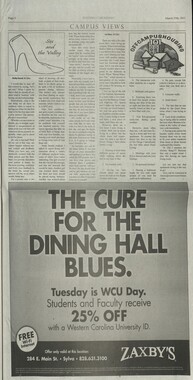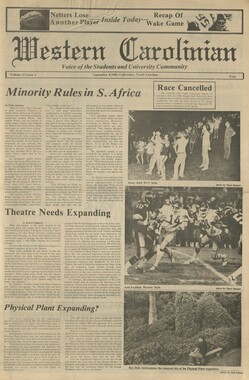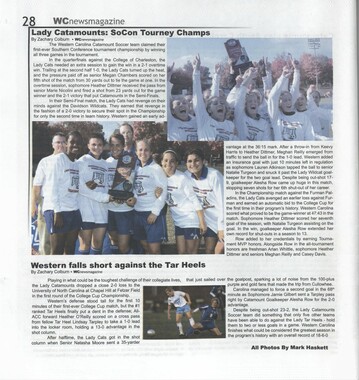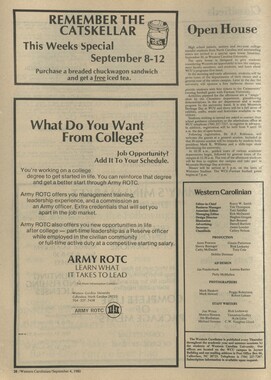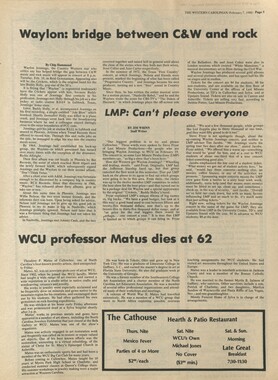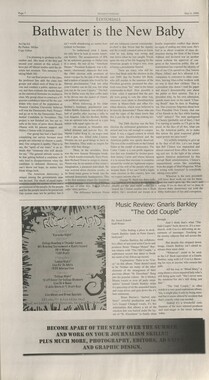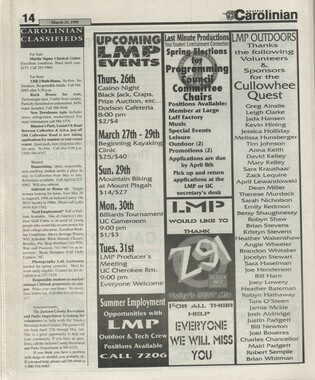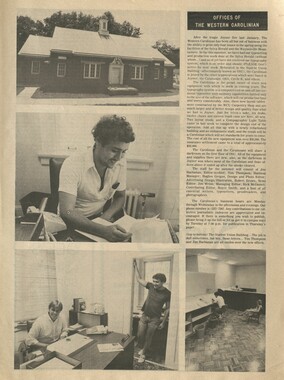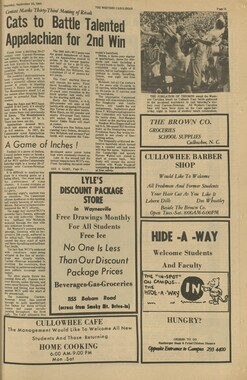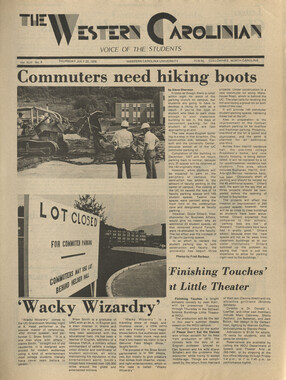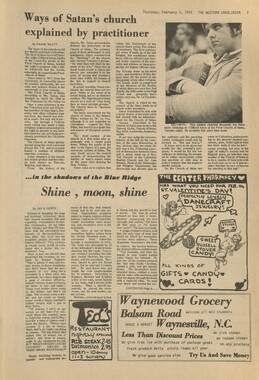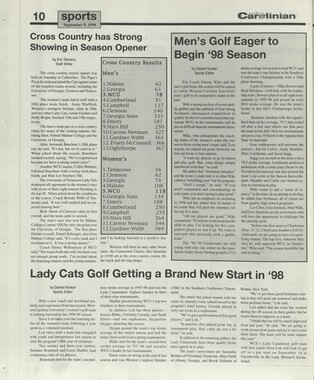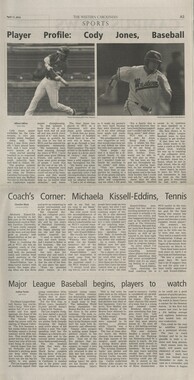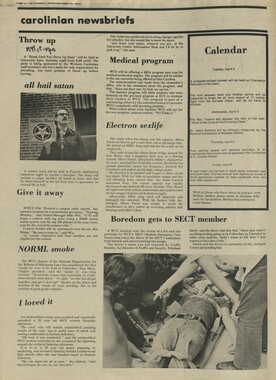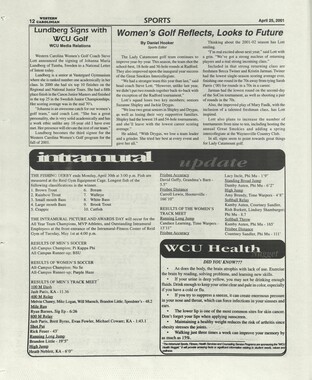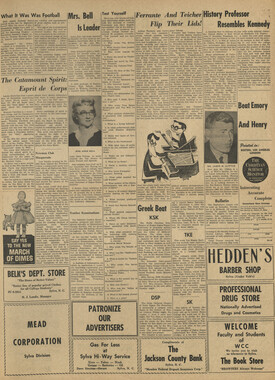Western Carolina University (20)
View all
- Canton Champion Fibre Company (2308)
- Cherokee Traditions (291)
- Civil War in Southern Appalachia (165)
- Craft Revival (1942)
- Great Smoky Mountains - A Park for America (2946)
- Highlights from Western Carolina University (430)
- Horace Kephart (941)
- Journeys Through Jackson (159)
- LGBTQIA+ Archive of Jackson County (85)
- Oral Histories of Western North Carolina (314)
- Picturing Appalachia (6873)
- Stories of Mountain Folk (413)
- Travel Western North Carolina (160)
- Western Carolina University Fine Art Museum Vitreograph Collection (129)
- Western Carolina University Herbarium (92)
- Western Carolina University: Making Memories (738)
- Western Carolina University Publications (2491)
- Western Carolina University Restricted Electronic Theses and Dissertations (146)
- Western North Carolina Regional Maps (71)
- World War II in Southern Appalachia (131)
University of North Carolina Asheville (6)
View all
- Allanstand Cottage Industries (62)
- Appalachian National Park Association (53)
- Bennett, Kelly, 1890-1974 (1463)
- Berry, Walter (76)
- Brasstown Carvers (40)
- Carver, George Washington, 1864?-1943 (26)
- Cathey, Joseph, 1803-1874 (1)
- Champion Fibre Company (233)
- Champion Paper and Fibre Company (297)
- Cherokee Indian Fair Association (16)
- Cherokee Language Program (22)
- Crowe, Amanda (40)
- Edmonston, Thomas Benton, 1842-1907 (7)
- Ensley, A. L. (Abraham Lincoln), 1865-1948 (275)
- Fromer, Irving Rhodes, 1913-1994 (70)
- George Butz (BFS 1907) (46)
- Goodrich, Frances Louisa (120)
- Grant, George Alexander, 1891-1964 (96)
- Heard, Marian Gladys (60)
- Kephart, Calvin, 1883-1969 (15)
- Kephart, Horace, 1862-1931 (313)
- Kephart, Laura, 1862-1954 (39)
- Laney, Gideon Thomas, 1889-1976 (439)
- Masa, George, 1881-1933 (61)
- McElhinney, William Julian, 1896-1953 (44)
- Niggli, Josephina, 1910-1983 (10)
- North Carolina Park Commission (105)
- Osborne, Kezia Stradley (9)
- Owens, Samuel Robert, 1918-1995 (11)
- Penland Weavers and Potters (36)
- Roberts, Vivienne (15)
- Roth, Albert, 1890-1974 (142)
- Schenck, Carl Alwin, 1868-1955 (1)
- Sherrill's Photography Studio (2565)
- Southern Highland Handicraft Guild (127)
- Southern Highlanders, Inc. (71)
- Stalcup, Jesse Bryson (46)
- Stearns, I. K. (213)
- Thompson, James Edward, 1880-1976 (226)
- United States. Indian Arts and Crafts Board (130)
- USFS (683)
- Vance, Zebulon Baird, 1830-1894 (1)
- Weaver, Zebulon, 1872-1948 (58)
- Western Carolina College (230)
- Western Carolina Teachers College (282)
- Western Carolina University (2008)
- Western Carolina University. Mountain Heritage Center (18)
- Whitman, Walt, 1819-1892 (10)
- Wilburn, Hiram Coleman, 1880-1967 (73)
- Williams, Isadora (3)
- Cain, Doreyl Ammons (0)
- Crittenden, Lorraine (0)
- Rhodes, Judy (0)
- Smith, Edward Clark (0)
- Appalachian Region, Southern (2569)
- Asheville (N.C.) (1923)
- Avery County (N.C.) (26)
- Blount County (Tenn.) (195)
- Buncombe County (N.C.) (1672)
- Cherokee County (N.C.) (283)
- Clay County (N.C.) (555)
- Graham County (N.C.) (236)
- Great Smoky Mountains National Park (N.C. and Tenn.) (519)
- Haywood County (N.C.) (3569)
- Henderson County (N.C.) (70)
- Jackson County (N.C.) (4912)
- Knox County (Tenn.) (35)
- Knoxville (Tenn.) (13)
- Lake Santeetlah (N.C.) (10)
- Macon County (N.C.) (420)
- Madison County (N.C.) (215)
- McDowell County (N.C.) (39)
- Mitchell County (N.C.) (132)
- Polk County (N.C.) (35)
- Qualla Boundary (982)
- Rutherford County (N.C.) (76)
- Swain County (N.C.) (2182)
- Transylvania County (N.C.) (270)
- Watauga County (N.C.) (12)
- Waynesville (N.C.) (86)
- Yancey County (N.C.) (72)
- Aerial Photographs (3)
- Aerial Views (60)
- Albums (books) (4)
- Articles (1)
- Artifacts (object Genre) (228)
- Bibliographies (1)
- Biography (general Genre) (2)
- Cards (information Artifacts) (38)
- Clippings (information Artifacts) (191)
- Copybooks (instructional Materials) (3)
- Crafts (art Genres) (622)
- Depictions (visual Works) (21)
- Design Drawings (1)
- Drawings (visual Works) (185)
- Envelopes (73)
- Exhibitions (events) (1)
- Facsimiles (reproductions) (1)
- Fiction (general Genre) (4)
- Financial Records (12)
- Fliers (printed Matter) (67)
- Glass Plate Negatives (381)
- Guidebooks (2)
- Internegatives (10)
- Interviews (815)
- Land Surveys (102)
- Letters (correspondence) (1013)
- Manuscripts (documents) (618)
- Maps (documents) (177)
- Memorandums (25)
- Minutes (administrative Records) (59)
- Negatives (photographs) (6090)
- Newsletters (1290)
- Newspapers (2)
- Notebooks (8)
- Occupation Currency (1)
- Paintings (visual Works) (1)
- Pen And Ink Drawings (1)
- Periodicals (193)
- Personal Narratives (10)
- Photographs (12976)
- Plans (maps) (1)
- Poetry (5)
- Portraits (4568)
- Postcards (329)
- Programs (documents) (181)
- Publications (documents) (2443)
- Questionnaires (65)
- Relief Prints (26)
- Sayings (literary Genre) (1)
- Scrapbooks (282)
- Sheet Music (2)
- Slides (photographs) (402)
- Songs (musical Compositions) (2)
- Sound Recordings (796)
- Specimens (92)
- Speeches (documents) (18)
- Tintypes (photographs) (8)
- Transcripts (322)
- Video Recordings (physical Artifacts) (23)
- Text Messages (0)
- A.L. Ensley Collection (275)
- Appalachian Industrial School Records (7)
- Appalachian National Park Association Records (336)
- Axley-Meroney Collection (2)
- Bayard Wootten Photograph Collection (20)
- Bethel Rural Community Organization Collection (7)
- Blumer Collection (5)
- C.W. Slagle Collection (20)
- Canton Area Historical Museum (2110)
- Carlos C. Campbell Collection (462)
- Cataloochee History Project (64)
- Cherokee Studies Collection (4)
- Daisy Dame Photograph Album (5)
- Daniel Boone VI Collection (1)
- Doris Ulmann Photograph Collection (112)
- Elizabeth H. Lasley Collection (1)
- Elizabeth Woolworth Szold Fleharty Collection (4)
- Frank Fry Collection (95)
- George Masa Collection (173)
- Gideon Laney Collection (452)
- Hazel Scarborough Collection (2)
- Hiram C. Wilburn Papers (28)
- Historic Photographs Collection (236)
- Horace Kephart Collection (861)
- Humbard Collection (33)
- Hunter and Weaver Families Collection (1)
- I. D. Blumenthal Collection (4)
- Isadora Williams Collection (4)
- Jesse Bryson Stalcup Collection (47)
- Jim Thompson Collection (224)
- John B. Battle Collection (7)
- John C. Campbell Folk School Records (80)
- John Parris Collection (6)
- Judaculla Rock project (2)
- Kelly Bennett Collection (1482)
- Love Family Papers (11)
- Major Wiley Parris Civil War Letters (3)
- Map Collection (12)
- McFee-Misemer Civil War Letters (34)
- Mountain Heritage Center Collection (4)
- Norburn - Robertson - Thomson Families Collection (44)
- Pauline Hood Collection (7)
- Pre-Guild Collection (2)
- Qualla Arts and Crafts Mutual Collection (12)
- R.A. Romanes Collection (681)
- Rosser H. Taylor Collection (1)
- Samuel Robert Owens Collection (94)
- Sara Madison Collection (144)
- Sherrill Studio Photo Collection (2558)
- Smoky Mountains Hiking Club Collection (616)
- Stories of Mountain Folk - Radio Programs (374)
- The Reporter, Western Carolina University (510)
- Venoy and Elizabeth Reed Collection (16)
- WCU Gender and Sexuality Oral History Project (32)
- WCU Mountain Heritage Center Oral Histories (25)
- WCU Oral History Collection - Mountain People, Mountain Lives (71)
- WCU Students Newspapers Collection (1923)
- Western North Carolina Tomorrow Black Oral History Project (69)
- William Williams Stringfield Collection (2)
- Zebulon Weaver Collection (109)
- African Americans (390)
- Appalachian Trail (35)
- Artisans (521)
- Cherokee art (84)
- Cherokee artists -- North Carolina (10)
- Cherokee language (21)
- Cherokee pottery (101)
- Cherokee women (208)
- Church buildings (189)
- Civilian Conservation Corps (U.S.) (111)
- College student newspapers and periodicals (2012)
- Dams (107)
- Dance (1023)
- Education (222)
- Floods (61)
- Folk music (1015)
- Forced removal, 1813-1903 (2)
- Forest conservation (220)
- Forests and forestry (1184)
- Gender nonconformity (4)
- Great Smoky Mountains National Park (N.C. and Tenn.) (181)
- Hunting (45)
- Landscape photography (25)
- Logging (119)
- Maps (83)
- Mines and mineral resources (8)
- North Carolina -- Maps (18)
- Paper industry (38)
- Postcards (255)
- Pottery (135)
- Railroad trains (72)
- Rural electrification -- North Carolina, Western (3)
- School integration -- Southern States (2)
- Segregation -- North Carolina, Western (5)
- Slavery (5)
- Sports (452)
- Storytelling (243)
- Waterfalls -- Great Smoky Mountains (N.C. and Tenn.) (66)
- Weaving -- Appalachian Region, Southern (280)
- Wood-carving -- Appalachian Region, Southern (328)
- World War, 1939-1945 (173)
Western Carolinian Volume 67 Number 18
Item
Item’s are ‘child’ level descriptions to ‘parent’ objects, (e.g. one page of a whole book).
-
-
newsmagazine technoloo feature D january 8 - 21, 2003% newsmagazine Internet Scams Keep ing, and Going, and , , , By Michael J. Himowitz I The Baltimore Sun In "The Magnificent Seven, " one of Hollywood's greatest horse operas, there's a wonderful moment where Eli Wallach, playing the evil bandit Calvera, surveys the timid Mexican villagers his gang has robbed and terrorized and says, "If God did not want them shorn, he would not have made them sheep. " It's a saying that con artists use to describe their victims, too. In fact, some attribute it to showman P. T. Barnum, along with the adage: "There's a sucker born every minute. " There's no evidence that Barnum uttered either aphorism. But I understand the sentiment whenever I get a breathless message asking me to expose some "new" e-mail scam on the Internet. For example, hardly a week goes by without an outraged missive or two about the "Nigerian oil" flimflam. This con has been around so long that I'm amazed anyone still pays attention. But as Barnum never implied, there's an endless supply of sheep. And the shearers always have new clippers. The classic scheme is known as the "Advance Fee" or "4-1-9" scam, named after the fraud section of the Nigerian penal code. Here's how it works: You get an e-mail from someone who claims to be an official of the Nigerian government or his widow (before the Internet, the scammers used faxes and letters on official-looking stationery). The writer may identify himself as being from some other country, but most of the scams exposed so far originate in Nigeria, or among certain groups of Nigerians abroad. In any case, Dr. Opara, Dr. Akulunon, Mr. Theo or Mrs. Abacha (the names on four of the Nigerian scam e- mails I've received in the past week) say they have access to millions of dollars in Nigerian accounts that were accumulated as the result of bribes, kickbacks, or unclaimed estates. They want your help in getting the money out of the country, in return for which you get a cut of the dough. Of course, as one of my collected letters notes: "You should bear in mind that you will be required to put head together With us, and give this business transaction moral and financially support it required to be successful. " The "financial" support is the kicker—you're supposed to come up with an "advance fee" to be used as a bribe or some other kind of payment. I won't go into more detail—let's just say that thousands of people have taken the bait over the past two decades, and they've all lost their shirts. A few have even visited Nigeria to check the sender's bona fides, where they've been conned again, often with the connivance of Nigerian officials. There may even be serious danger: According to the State Department, 25 deaths are attributed to the 4-1-9 scheme. You can read the official State department warning at www.state.gov/ www/regions/africa/naffpub.pdf (you'll need the Adobe Acrobat Reader). For more evidence, visit the Secret Service at www.secretservice.gov/alert419.shtml. Now to the latest wrinkle, which victimizes people selling high-ticket items, such as used cars, through eBay auctions and Internet car sites. Typically, the buyer identifies himself as a Nigerian who says he'll have a friend or business associate in the United States send the seller a cashier's check to cover the cost of the car, plus shipping to Nigeria. The transportation fee is often more than the cost of the item itself. In return, the buyer asks the seller to wire the transportation fee to Nigeria so he can arrange shipment. Not being a fool, the seller waits till his bank tells him the money from the check is available, and then wires the shipping fee to the buyer's Nigerian account. Days or even weeks later, the bank notifies the seller that the cashier's check was forged, and the seller has to make good. By that time, the buyer and his U.S. accomplice have disappeared. The scheme takes advantage of a little-known glitch in the banking system. Under federal regulations, banks have to provide access to funds from a deposited check within five days. Unfortunately, if the check is a forgery, which won't be discovered until the issuing bank inspects it, the depositor is liable. This scam is particularly insidious because the victim thinks he's taking every precaution. When the bank says the money available, he thinks the check has cleared. But that's not necessarily the case. No one knows exactly how many have been caught by this particular fraud, but you'll find a support group for victims at www.geocities.com/ scamvictimsunited. You'll find detailed and often- humorous descriptions of dozens of scams at www.quatloos.com. Or check out the National Consumers League's Fraud Information Center at www.fraud.org. The moral of these tales is that if any part of a deal doesn't sound 100 percent kosher, walk away from it. 0 2002 Distributed by the Los Angeles Times-Washington Post News Service essayContest Throughout the Spring 2003 semester you will have an opportunity to win up to $125* for sending us your thoughts on selected topics- Are you an aspiring writer but do not know how to get published? Do you have opinions that you want to express and need a place to voice them? Or do you just simply love to write? WCnewsmagazine is pleased to present a new Essay section. In 600-800 words in Word@ (doc or urtf) format, address any of the following topics and e-mail it to us, You could win a $25 cash prize for your essay and be eligible to win a $100 cash Grand Prize for best overall essay (Issues 19-21)ü See the information below for the Essay topics for Issues 19-21. Essays unrelated to these topics will be accepted for print in a separate section but will not be eligible for the contest, We will release topics for Issues 22-25 in Issue .20. Send your *doc to us: WC@WCUEEDU *Essays must follow the topic provided for that particular issue and meet the materials deadline. Unrelated essays are accepted but are not eligible for contest prizesn Essays will be judged by the editorial board based upon the strength of the argument regardless of the position presented. essay topics ESSAY: "HATE SYMBOLS SHOULD THEY BE OUTLAWED?" I Hate symbols protected free speech or criminal intimidation? Last month the Supreme Court heard arguments concerning the right to burn a cross on someone's private property. We want to know what you think. Do you believe cross burning should be outlawed? Should all hate symbols be outlawed? Can you legislate which symbols stir feelings of intimidation and which ones are benign? In a 600-800 word essay, tell us what you think. Essay Winner receives $25 and is eligible to. compete for a $100 Grand Prize. Materials Deadline - January 15, 2003 Issue 20 | February 5 18 ESSAY: "CAN GOVERNMENT LEGISLATE FAIRNESS?" Decades Later - Affirmative Action, Title IX and other legislative initiatives have attempted to legislate fairness, Success - or Failure, what do you think? Do you think such laws should continue? Should the Bush administration reexamine Affirmative Action? Does Title IX place unfair requirements on smaller universities? Write a 600-800 word essay telling us what you think. Essay Winner receives $25 and is eligible for a $100 Grand Prize.Materials Deadline January 22, 2003 Issue 21 | February 19 March 18 ESSAY: "DISPELLING MYTHS ABOUT WOMEN"- March is Women's History Month. Is feminism dead? Are there occupations and activities that are distinctly male or female in nature? Does equal mean the same? Are women as capable as their male counterparts? Tell us what you think in a 600 800 word essay. Essay Winner receives $25 and is eligible for a $100 Grand Prize. Materials Deadline February 5, 2003 8,
Object
Object’s are ‘parent’ level descriptions to ‘children’ items, (e.g. a book with pages).
-
The Western Carolinian is Western Carolina University's student-run newspaper. The paper was published as the Cullowhee Yodel from 1924 to 1931 before changing its name to The Western Carolinian in 1933.
-
